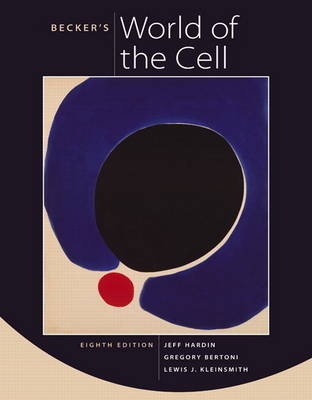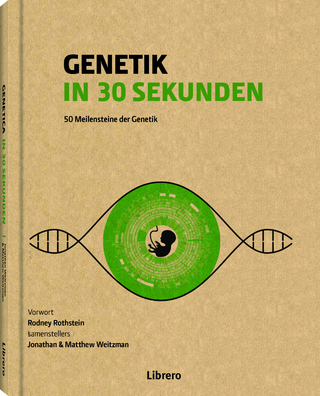
Becker's World of the Cell
Pearson (Verlag)
978-0-321-71602-6 (ISBN)
- Titel erscheint in neuer Auflage
- Artikel merken
Jeff Hardin is Professor and Chair of the Zoology Department at the University of Wisconsin—Madison. His research interests center on how cells migrate and adhere to one another to change the shape of animal embryos. Dr. Hardin’s teaching is enhanced by his extensive use of digital microscopy and his Web-based teaching materials, which are used on many campuses in the United States and other countries. As part of his interest in teaching biology, Dr. Hardin was a founding member of the University of Wisconsin Teaching Academy. He is currently faculty director of the Biology Core Curriculum, a four-semester honors biology sequence for undergraduates. His teaching awards include a Lily Teaching Fellowship and a National Science Foundation Young Investigator Award. He is also on the editorial board of CBE: Life Sciences Education, and is curator of WormClassroom, a digital initiative that promotes the use of C. elegans in college classrooms and laboratories. Gregory Bertoni has been active in teaching, research, and scientific writing for over 25 years. He earned a Ph.D. in Cellular and Molecular Biology from the University of Wisconsin—Madison, where his teaching experiences included introductory and graduate-level biochemistry, sophomore cell biology, and plant physiology. He also helped to develop a new course entitled “Ways of Knowing” designed to introduce entering freshmen to the learning process itself. His published research includes studies in bacterial pathogenesis, plant-microbe interactions, and plant gene expression. Dr. Bertoni is a science editor for The Plant Cell, a leading research journal in plant cell and molecular biology. His duties include communicating with authors around the world to ensure that published papers are accurate and accessible to both general and expert readers worldwide. He has also been teaching biology and medical microbiology at Columbus State Community College in Columbus, Ohio for most of the past 10 years. In addition, Dr. Bertoni is a freelance scientific writer who has contributed to text- and web-based projects in biology, physics, and microbiology and currently assists authors in preparing manuscripts for publication. Lewis J. Kleinsmith is an Arthur F. Thurnau Professor Emeritus of Molecular, Cellular, and Developmental Biology at the University of Michigan, where he has served on the faculty since receiving his Ph.D. from Rockefeller University in 1968. His teaching experiences have involved courses in introductory biology, cell biology, and cancer biology, and his research interests have included studies of growth control in cancer cells, the role of protein phosphorylation in eukaryotic gene regulation, and the control of gene expression during development. Among his numerous publications, he is the author of Principles of Cancer Biology as well as several award-winning educational software programs. His honors include a Guggenheim Fellowship, the Henry Russell Award, a Michigan Distinguished Service Award, citations for outstanding teaching from the Michigan Students Association, an NIH Plain Language Award, and a Best Curriculum Innovation Award from the EDUCOM Higher Education Software Awards Competition
1. A Preview of the Cell
2. The Chemistry of the Cell
3. The Macromolecules of the Cell
4. Cells and Organelles
5. Bioenergetics: The Flow of Energy in the Cell
6. Enzymes: The Catalysts of Life
7. Membranes: Their Structure, Function, and Chemistry
8. Transport Across Membranes: Overcoming the Permeability Barrier
9. Chemotrophic Energy Metabolism: Glycolysis and Fermentation
10. Chemotrophic Energy Metabolism: Aerobic Respiration
11. Phototrophic Energy Metabolism: Photosynthesis
12. The Endomembrane System and Peroxisomes
13. Signal Transduction Mechanisms: I. Electrical and Synaptic Signaling in Neurons
14. Signal Transduction Mechanisms: II. Messengers and Receptors
15. Cytoskeletal Systems
16. Cellular Movement: Motility and Contractility
17. Beyond the Cell: Cell Adhesion, Cell Junctions, and Extracellular Structures
18. The Structural Basis of Cellular Information: DNA, Chromosomes, and the Nucleus
19. The Cell Cycle, DNA Replication, and Mitosis
20. Sexual Reproduction, Meiosis, and Genetic Recombination
21. Gene Expression: I. The Genetic Code and Transcription
22. Gene Expression: II. Protein Synthesis and Sorting
23. The Regulation of Gene Expression
24. Cancer Cells
Appendix–Visualizing Cells and Molecules
Glossary
Photo, Illustration, and Text Credits
Index
| Erscheint lt. Verlag | 3.2.2011 |
|---|---|
| Sprache | englisch |
| Maße | 224 x 286 mm |
| Gewicht | 1982 g |
| Themenwelt | Naturwissenschaften ► Biologie ► Genetik / Molekularbiologie |
| Naturwissenschaften ► Biologie ► Zellbiologie | |
| ISBN-10 | 0-321-71602-7 / 0321716027 |
| ISBN-13 | 978-0-321-71602-6 / 9780321716026 |
| Zustand | Neuware |
| Informationen gemäß Produktsicherheitsverordnung (GPSR) | |
| Haben Sie eine Frage zum Produkt? |
aus dem Bereich



